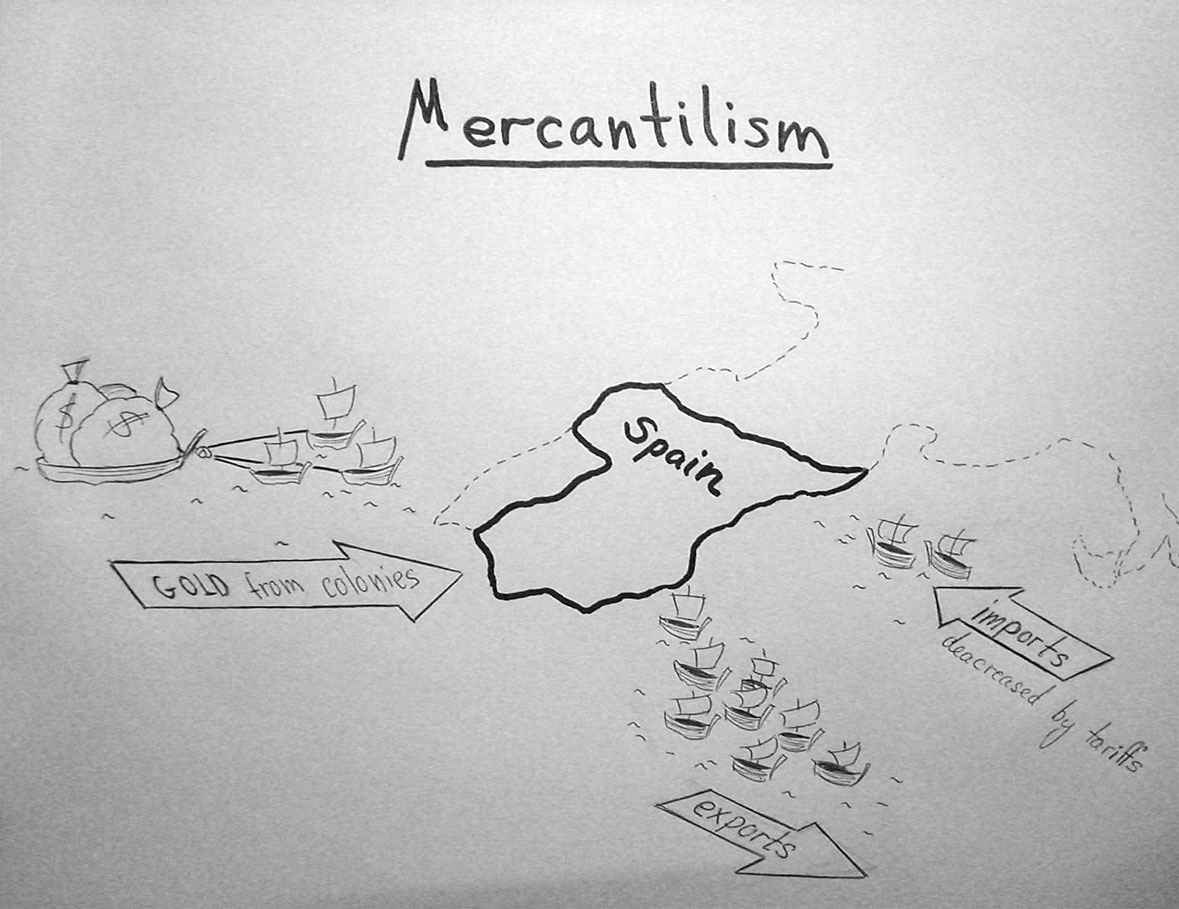The ‘Commercial Revolution’ which took place between 1450 and 1750 brought a revolutionary change in the economy of Europe.
Many countries of Europe encouraged the intervention of state in commercial activities for the increase of national wealth and power.
This gave birth to ‘Mercantilism’ which played a vital role for the economic prosperity of a country. This Mercantilism created a milestone in the field of European Economy.
ADVERTISEMENTS:
Meaning of ‘Mercantilism’:
Adam Smith, the ‘Father of Economics’ had first used the word ‘Mercantilism’ in his famous book ‘Wealth of Nations’. Mercantilism means-“Governmental regulation of economic affairs, especially, trade and industry”. The exponents of Mercantilism opined that Commerce is the key to progress of every country and it can be achieved at the cost of the interest of other country. Although they put emphasis on economy, they never wanted the intervention in politics.
Causes of the Rise of Mercantilism:
Mercantilism grew due to several reasons. At first, the Renaissance did not accept the religious doctrine of Medieval Europe. It explained ‘Materialism’ as one of the mediums of human happiness. So, everybody dreamt to lead a happy and prosperous life. This gave birth to Mercantilism.
Secondly, the Fall of Feudalism was another cause for the rise of Mercantilism. With the fall of feudalism, the fate of agriculture was doomed. This encouraged the small-scale industries. The towns and guilds wanted the increase of these industries. They wanted to export the surplus of these productions. This led to the rise of Mercantilism.
ADVERTISEMENTS:
Thirdly, the Reformation Movement encouraged the merchants. The results of the Reformation Movement carried on by Martin Luther in Germany and Henry VIII in England were far reaching. They condemned the unnecessary intervention of Pope in Political and Economic affairs except religion.
Martin Luther opposed the Pope so much so that he was issued ‘Bull of excommunication’ by the Pope. However, Luther did not bend before it. In a similar vein Henry VIII of England did not obey Pope and brought reformation in the Church of England.
All these activities encouraged the merchants to take up their business independently. This encouraged Mercantilism.
Fourthly, the Guilds and Banking System gave great impetus for the growth of Mercantilism. The guilds acted as distribution centres and exported the surplus to outside countries. This encouraged the international trade which was well-regulated by the banking system. Thus, Mercantilism grew out and out.
Fifthly, the Geographical Discoveries encouraged Mercantilism. The sea voyage of Columbus, Vascodagama, Magellan and others encouraged Mercantilism.
Sixthly, Political Patronage established Mercantilism on sound footing. The kings wanted to reduce the power of the feudal Lords and Barons. So, they encouraged the merchants for trade. Henry, ‘the Navigator’ of Portugal and Henry VIII and Queen Elizabeth of England patronised sailors. Their patronage established Mercantilism on sound footing.
At last, Scientific Invention and Discoveries helped a lot in the growth of Mercantilism. The telescope invented by Galileo helped the merchants in their journey. The Mariner’s Compass also helped the merchants a lot to determine direction inside the deep sea. These inventions made merchants confident for maritime trade which galvanised Merchantilism.
Characteristics of Mercantilism:
Mercantilism had many characteristics. It was seen mostly in the European countries. Among those countries, England, France, Germany, Italy etc. were prominent.
The characteristics of Mercantilism were as such:
Foreign Trade:
At first, the merchants put emphasis on foreign trade. They knew that gold and silver are not plentily available in many countries. They wanted to procure gold and silver from other countries by sailing their own products to them. This was infact, one of the great characteristics of Mercantilism.
Money, ‘brighter than sun-shine and sweeter than honey’ was another feature of Mercantilism. The merchants had understood that for the development of trade, money is needed. So, they discarded ‘barter’. They had felt that “Money is what money does”. So money economy galavanised Mercantilism.
Moon, a notable economist had advised to charge interest on principal when money was lent. It increased the amount of money inside a country. On the other hand, it also inspired a trader to work hard for the repayment of money what he had borrowed and also encouraged him to be rich. Thus, profit and benefit became two sides of Mercantilism.
Population:
Mercantilism put emphasis on population. Devenant had opined that the real power of a country is its population. The presence of more population helps in the growth of industry which leads to more production. Samuel Fortre had advised that in case of need, the refugees are to be employed in different factories and given shelter in the country for more production.
Medium of Production:
The exponents of Mercantilism put emphasis on ‘land’ and ‘labour’. In the language of Peltti “Labour is the father…. as lands are the mother”. So, Mercantilism delivered a message that a country should be economically prosperous. By this, a country should be self-sufficient in production.
Regulation of Trade and Commerce:
The merchants of Europe had devised means to regulate trade and commerce of a country. Every European Country framed laws to regulate its trade and commerce. By these laws, it was not possible to import goods from outside countries. This helped in exporting the surplus of the country.
Encouragement to Capitalism:
Mercantilism was meant to encourage capitalism. The capitalists invested their capital and made mercantilism more mobile. It was difficult on the part of Mercantilism to thrive without capital. This helped in the growth of trade and commerce.
The Golden Principles:
The ‘Golden Principles’ of Mercantilism contained its chief characteristics. Those principles were self-dependency, industry, mine, commerce, naval power, colony, unity etc. Being guided by these principles, colonialism reached the pinnacle of success.


